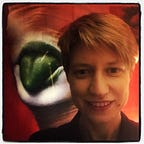Rachel — a Jewish girl in her class
“I’d like to learn about the Jews in your town grandma; before the war started” — I asked during one of my weekend visits to gran’s apartment. As part of the anthropology of culture module I took that year, we were to interview our relatives about their experience of Jewish communities in Poland. We sat on two armchairs in the living room, which is also a bedroom and a dining room. A wall of windows lets the light in even on a misty afternoon. On hot, midsummer days, grandma needs to draw the curtains to keep the room cooler.
“The Jews in Trzebinia…there were so many of them” — grandma leaned back on her armchair and presented her memories as if awaiting that airtime for years.
“They ran shops, they were doctors and lawyers. My mummy would bring me to a greengrocer owned by a Jew. But she told me not to get too friendly with Jewish children at school. She wouldn’t let me visit Jewish houses. They were different from us, the Jews, they dressed differently. The women wore wigs and had their natural hair shaved off. I couldn’t understand that; it seemed so strange to me, and I think I was a bit scared of it as well.”
“Can you remember anyone who you had closer encounter with? “ — I prompted.
“There was this little girl, Rachel. She joined our class later in the school year and the teacher told her to sit next to me. I wasn’t nice to her at all. I didn’t share my crayons; I didn’t talk to her; just kept to myself and remembered what mummy said about maintaining the distance.”
“Do you stil think about her from time to time?” — I asked.
“She survived the war” — grandma either didn’t hear the question or didn’t want to be interrupted.
“How do you know that?” — I followed her stream of thought.
“Oh, I found out years later through a Polish girl in my class — Barbara. Barbara escaped to America just before the war and so did Rachel and her mother. After the war Rachel married a German Jew, Josef; he worked with Barbara’s father in a Cardiology unit in Chicago. They were both talented heart surgeons. They performed first bypass surgeries, then heart transplants. In 1960ies Rachel and Josef went to Israel. He became Head of the Cardiology unit in Tel Aviv. Barbara got in touch with me sometime in early 1950ies. I was already married to your grandad. She wrote a letter to our old address and as you know, when the bombings in Trzebinia ended, we came back to our family home. My mummy passed the letter on to me. So, me and Barbara started corresponding and that’s how the relationship developed. And then, when your grandfather’s heart problems worsened, she told me about that new unit in Tel Aviv. At the time they had the latest technology and this talented head of the unit — Rachel’s husband. Barbara made the initial contact with Rachel on my behalf. She insisted I follow up and ask for help. So, I did. And Rachel couldn’t be more helpful. At that time the Jews in Poland were persecuted by the communists. In 1968 over thirteen thousand Jews were driven out of Poland and stripped off their citizenship. Traveling to Israel for the operation was going to be very problematic. But Rachel arranged everything. She persuaded her husband to use his influence and to issue official documents. The hospital financed the operation. Grandad Jurek, as a member of the Communist Party received permission to travel, and we went together, so I could look after him during recovery. Your mother and your aunt stayed with my parents when we were away. It took eight weeks. Rachel’s determination saved your grandad. She saved him. We were fellow human beings to her. She saw people in need and offered help. I was initially shocked by her kindness and ashamed of my own actions from years before. I never forgot the atmosphere of those school years before the war, I’m sure she didn’t either. But she looked beyond that, all what mattered to her was to act in good faith. I think a lot about her these days. How I treated her back then, why mummy was so against me being friends with her. I remember Rachel had a beautiful doll and I secretly stared at her when she played with it in the school yard. I admired the doll’s dark eyes and brown curly hair, and I fought the urge to come up to Rachel and ask if I could hold the doll.
Sometimes when I can’t go to sleep I play this scene in my head. I see myself approaching Rachel and asking; ‘Can I hold your doll, Rachel?’ And she replies: ‘Yes, just be careful with her head, it’s made of porcelain.’ And this is the beginning of a lifelong friendship.
But those friendships never happened, and the chance is lost, the Jews are gone from this country.”
“What would you like me to learn from that story grandma?”
“That when you meet someone new in your life, you should always remember — this is a fellow human being. As Kapuscinski said: ‘encounter with the other involves will and effort’. I would like you to undertake it. It will enrich your life. Would you like some more tea?”
Grandma was on her way to the kitchen before I managed to respond. She brought a tray with cups of fresh tea, a plate of biscuits and strawberries. We sat in silence, shapes outside the window slowly disappeared in the darkness.
